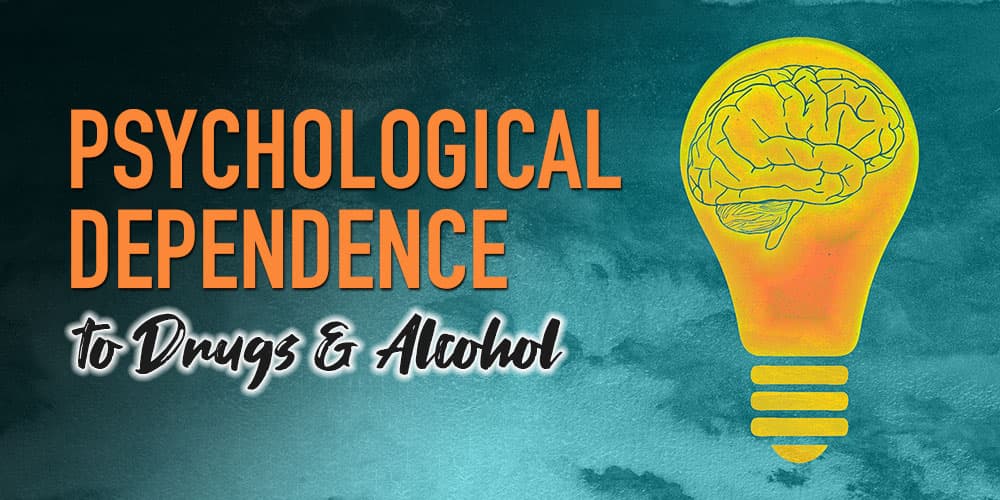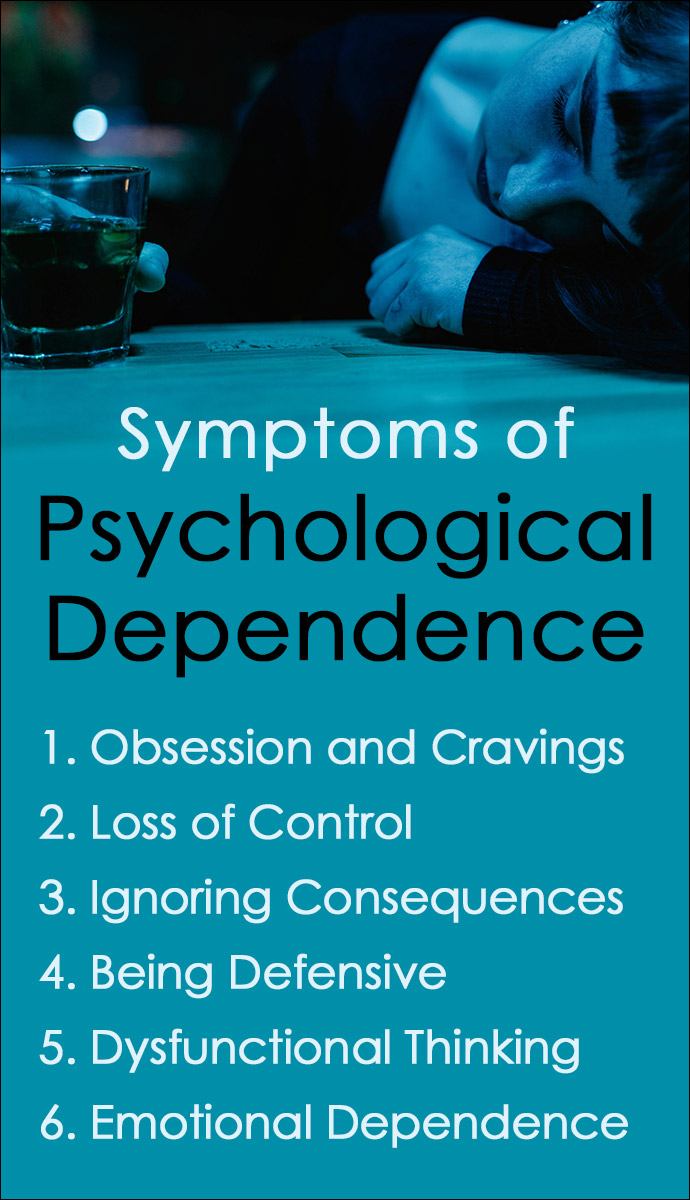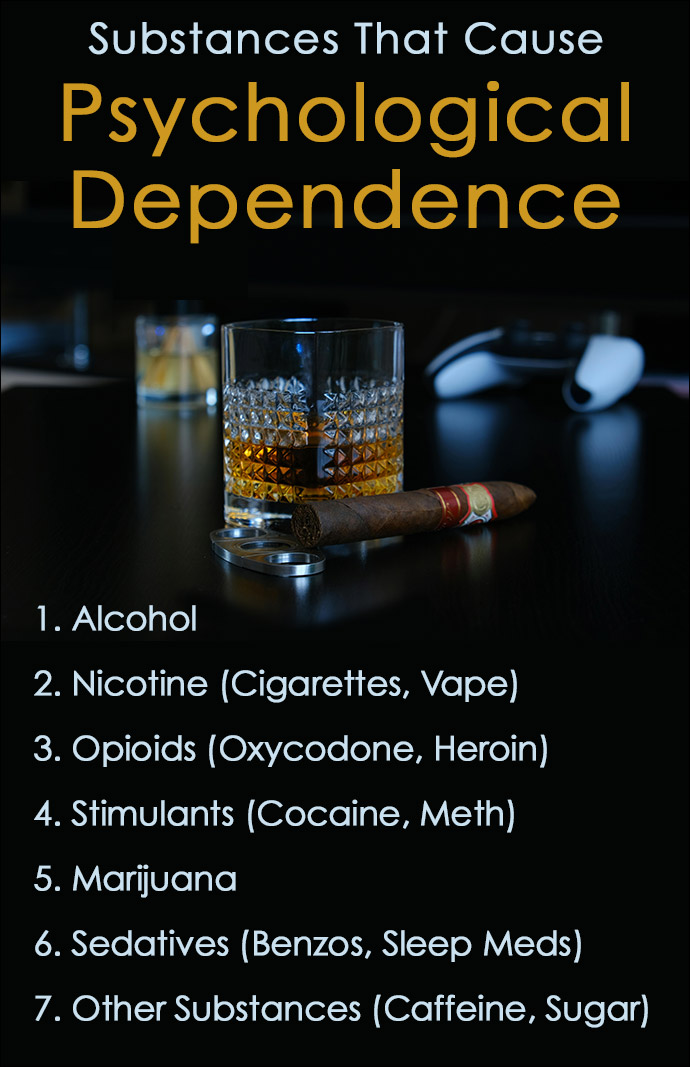
Psychological dependence on drugs or alcohol is sometimes called emotional or mental dependence because it refers to the emotional attachment people develop with addictive substances or behaviors.
While “physical dependence” involves changes in the body and brain due to chronic substance use, psychological dependence refers to the mental and emotional aspects of addiction.
Gaining a better understanding of the psychology of dependence can help those with substance use issues find the most appropriate treatment for recovery.
Psychological Dependence Definition
OpenMD.com cites psychological dependence definition as:
Mental or Behavioral Dysfunction – a behavioral pattern characterized by a craving for the mood-altering effects of a drug and an overwhelming preoccupation with obtaining and using the drug.
In essence, psychological dependence is defined as an emotional or mental reliance on the effects produced by a substance or behavior.
This occurs when an individual develops dysfunctional thought patterns and beliefs that make them feel they need a substance to cope with life or to be happy or feel normal.
What is Psychological Dependence?
Psychological dependence on drugs and alcohol is an emotional reliance or obsession with the effects of the substances and the way they make them feel.
Unlike the physical dependence that occurs from neurological changes due to chronic drug use, an individual believes they cannot function without using substances from a psychological or emotional standpoint.
This form of dependence involves a powerful desire to repeat the behavior, not because of any physiological withdrawal symptoms, but because of the emotional associations and cravings related to the effects of the substance.
These effects include enhanced mood, relaxation, confidence, or energy a person feels dependent on. They become obsessed with using a substance and if they are unable to use it, they may experience cravings, anxiety, irritability, or depression.
Psychological Dependence to Substances Often Includes:
- Powerful desire to repeat the behavior and the associated rewards
- Loss of control over behavior
- Using more drugs or alcohol than intended
- Spending excessive time seeking out, using, and recovering from the substances
- Failing to fulfill responsibilities due to substance use
- Continued use despite physical or psychological harm
- Dysfunctional thinking and denial that substance use is a problem
Psychological Dependence Symptoms
Recognizing the signs and symptoms of psychological dependence can be an important first step towards seeking treatment and recovery.
Many symptoms are related to dysfunctional thought patterns, emotions, and behaviors centered around substance use.

Common Psychological Dependence Symptoms Include:
1. Obsession and Cravings
This includes obsessive thoughts about using drugs or alcohol and frequent cravings for the substance.
2. Loss of Control
Loss of control involves unsuccessful attempts to reduce or quit using drugs or alcohol, using more than intended, and spending excessive time seeking out and using substances.
3. Using Substances Despite Negative Consequences
Failing to fulfill obligations and responsibilities due to substance use and continued use despite physical or mental impairment are common negative consequences.
4. Defense Mechanisms
Rationalizing or lying about substance use, denial of having a problem, and blaming others are all examples of defense mechanisms.
5. Dysfunctional Thinking
Dysfunctional thinking includes placing a high importance on substance use, believing that drugs or alcohol are necessary for coping with other issues, and only engaging in activities that are related to getting high.
6. Emotional Dependence
A person becomes emotionally dependent when they lose interest in sober activities, rely on substances to feel happy, and they are anxious, depressed, or irritable when not using alcohol or drugs.
Anhedonia causes a person to stop experiencing pleasure in things they once enjoyed and is tied to emotional dependence.
Psychological Dependence vs Psychological Addiction
There is a subtle difference between psychological dependence and psychological addiction.
Psychological Dependence
Psychological dependence refers to the emotional need and obsession with the effects of using a substance. This includes cravings for drugs or alcohol and using them as a coping mechanism to manage mood, emotions, and other issues.
Psychological Addiction
The National Institute on Drug Abuse (NIDA) defines addiction as “a chronic, relapsing disorder characterized by compulsive drug seeking and use despite adverse consequences. It is considered a brain disorder, because it involves functional changes to brain circuits involved in reward, stress, and self-control.”
Psychological addiction indicates continued use of a substance despite negative consequences, a loss of control, compulsive behaviors, and an inability to stop.
The main distinction is that psychological dependence relates to the emotional obsession and mental desire for substance use, whereas psychological addiction is marked by a pathological, uncontrollable compulsion to use a substance despite the harmful effects.
This means a person can be psychologically dependent without being clinically addicted. However, most people with a substance use addiction have some degree of psychological dependence that fuels their addictive behaviors.
Understanding and identifying the emotional attachment of a habit vs addiction is crucial for effective treatment and recovery.
Substances That Cause Psychological Dependence
Many types of substances can lead to psychological dependence, even if they do not necessarily cause a physiological addiction.
Substances That Cause Emotional or Mental Dependence Include:
1. Alcohol
Alcohol is one of the most used addictive substances and is associated with psychological cravings. It is also obsessively used for its euphoric effects and as a socially accepted coping method for relieving stress.
Alcohol cravings can be so strong for some people that they will continue drinking despite the occasional symptoms of a hangover.
2. Nicotine
Tobacco products like cigarettes that contain nicotine are some of the most addictive substances that cause intense psychological urges and habitual use.
For teens and young adults, learning how to stop vaping is less important than getting a daily nicotine fix caused by the strong emotional urges.
3. Opioids
Both illegal opioids like heroin and prescription pain medications have very high psychological dependency rates due to their extreme euphoric effects.
4. Stimulants
Cocaine, methamphetamine, and prescription stimulants induce psychological cravings due to increased energy, focus, and heightened mood.
5. Marijuana
The THC side effects of marijuana can create a psychological dependence to the pleasurable nature of its relaxing effects, elevated mood, and perceived creative stimulation.
6. Sedatives
Benzodiazepines, sleep medications, and other sedatives create an emotional dependence to their anti-anxiety and sleep enhancing qualities.
7. Other Substances
Legal substances like caffeine or sugar can cause an emotional dependence or addiction for people who can’t get enough of their energy-boosting or pleasurable effects.
Adopting a no sugar diet can be extremely difficult in part because we become dependent on the pleasurable way it makes us feel.
Virtually any substance that changes how a person feels can produce a psychological dependence. Understanding this type of emotional brain response is necessary for treating substance use issues.

Treatment for Psychological Dependence
Since psychological dependence relates to the mental obsession and emotional reliance on substance use, effective treatment needs to address both conscious and subconscious thought patterns, emotions, and behaviors.
Common Elements in Treatment Plans Include:
1. Therapy
Cognitive Behavioral Therapy helps identify distorted thinking that drives compulsive behaviors and teaches coping strategies for overcoming triggers and cravings.
Other evidence-based therapies like Motivational Enhancement Therapy help strengthen an individual’s commitment to change.
2. Support Groups
Support groups like 12-step programs or Smart Recovery provide a community, accountability, and peer understanding of like-minded individuals that are beneficial for sobriety and sharing coping strategies.
3. Medications
Anti-anxiety medications, antidepressants, and Medication Assisted Treatment can stabilize mood disorders and minimize drug cravings to support a healthy recovery.
4. Mind-Body Practices
Meditation, mindfulness, yoga, and similar practices promote relaxation and focus while reducing anxiety, depression, and physiological cravings.
5. Lifestyle Changes
Regular exercise, adequate sleep, and eating healthy foods are all necessary for improving physical and mental health.
Establishing structure through daily schedules, hobbies and social relationships not centered around substance use promote healthy behavior patterns.
When considering the progression of substance use, psychological dependence is usually the first stage to emerge on the path to addiction.
The emotional reward and pleasure appear early during the early phases of substance use, before chronic use changes the function and structure of the brain and person becomes addicted.
Seeking treatment at the early stage of psychological dependence can prevent substance use from advancing to clinical addiction where recovery is more difficult to overcome.
Related Posts
- Alcohol Dementia Causes, Symptoms and Treatment
Note: Alcohol Dementia goes by many names including, alcohol-related dementia, alcoholic dementia, and alcohol-induced dementia.…
- Alcohol Poisoning and Hangover Symptoms
Most adults who drink alcohol, either regularly or on special occasions, are likely to have…
- Fetal Alcohol Syndrome - What is It and What are the Symptoms?
Did you know that Fetal Alcohol Syndrome (FAS) is the leading cause of preventable birth…
